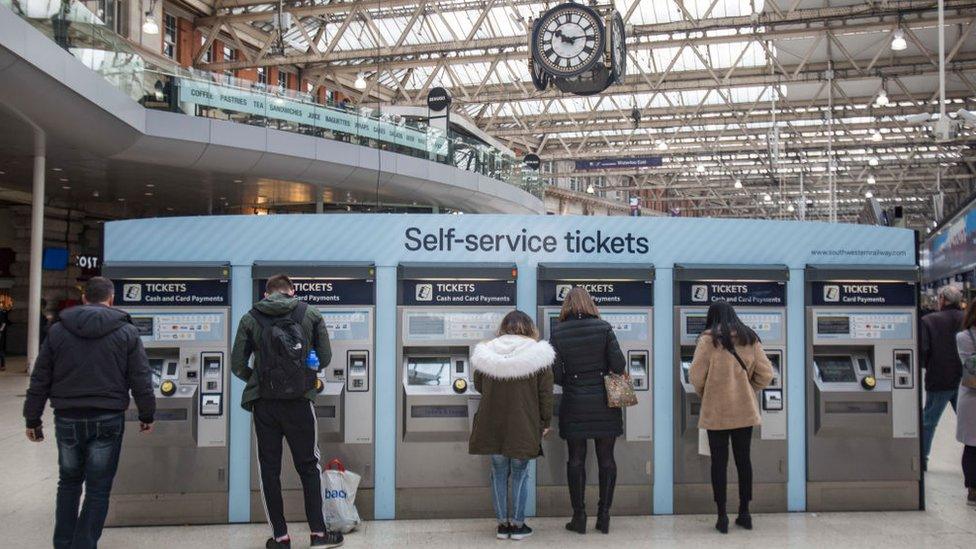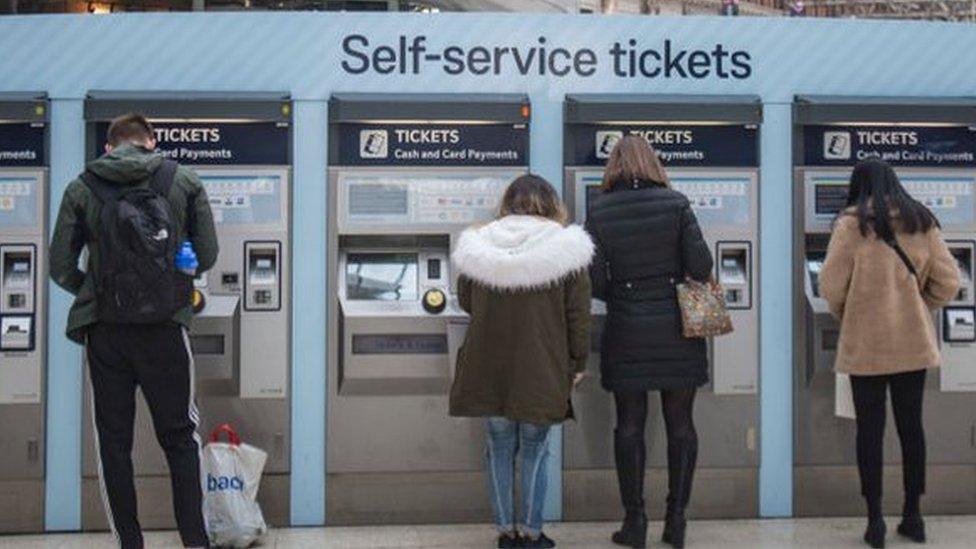Train firms plan mass closures of ticket offices
- Published
- comments

Train companies are pressing ahead with plans to close hundreds of station ticket offices across England over the next three years.
Under the proposals, some ticket kiosks would remain in large stations, but elsewhere staff will be on concourses to sell tickets, offer travel advice and help people with accessibility.
The plan has been met with concern from unions and disability groups.
A 21-day public consultation has been launched to collect passengers' views.
Posters have gone up in stations, inviting the public to take part, after which the government will make the final decision on which offices will close.
Currently around three out of every five stations has a ticket office, although some are only staffed part time.
The issue is the latest flashpoint between train companies and unions, who have been in a long-running dispute over pay, jobs and working conditions, which has resulted in a series of strikes since last summer.
The rail industry is under pressure from the government to cut costs after being supported heavily during the Covid pandemic.
"The ways our customers buy tickets has changed and it's time for the railway to change with them," said Jacqueline Starr chief executive of the Rail Delivery Group (RDG), which represents train companies. She said the changes would be phased in gradually.
Only 12% of tickets were sold at ticket offices last year, she said, with the rest bought online or from vending machines.
Under the plans, if a passenger was unable to purchase a ticket, they would be able to buy one during the journey, at a ticket office en-route or at their destination, the RDG said.
But many rail users, who rely on help at ticket offices, fear the changes will make it harder for them to travel.

Robert Calvert, 75, from Tamworth says his dyslexia and colour blindness make it hard to negotiate self-service machines.
"Remember not everyone has a smartphone these days," he says. "Everything is so automated, I feel slightly left behind."
Ann Jolly, 78, from Emsworth in Hampshire, often uses the train to travel to her native Scotland, but says she already finds the complication of how to buy train tickets "off-putting".
"I do use the self-service machine if I have to. Usually I manage, but I struggle with trying to find the different routes and knowing what I have to pay for. A lot of my friends feel the same.
"The train tickets are just incomprehensible online, especially when it says the tickets come from different companies, so I need a number of different ones for one trip."
The RDG says that staff will be just as readily available as they are now, but on the concourse or platform, where they can advise passengers on journey planning and sell tickets.
However, the UK's largest rail union the RMT and the TSSA union both warned the plans could ultimately lead to job cuts.
Some disability campaigners have also long opposed the idea.
Vivienne Francis from the Royal National Institute of Blind People (RNIB), said it would be "detrimental" for blind and partially-sighted people with only 3% of such people able to use a machine.
'Mind-bogglingly complicated'
Stewart Palmer is director of Railfuture, which represents passengers and campaigns for better rail services, and is a former managing director South West Trains. He said the consultation was "putting the cart before the horse".

"One of the root causes of this issue is that the present ticketing system on the rail network in Britain is mind-bogglingly complicated," he told the BBC's Today programme.
"People want versatile, knowledgeable staff, not necessarily behind a glass screen, but they also want to be knowing they're buying the right product at the right price."
The RDG said the proposals to close ticket offices followed industrial action by unions over other changes designed to make the railway "sustainable in the long term". The RDG said rail revenues were still 30% below pre-pandemic levels.
The Department for Transport said the proposals were not about cutting jobs, but about modernising the railway to make sure the sector survived.
Additional reporting by Emma Pengelly
Related topics
- Published13 March 2022
